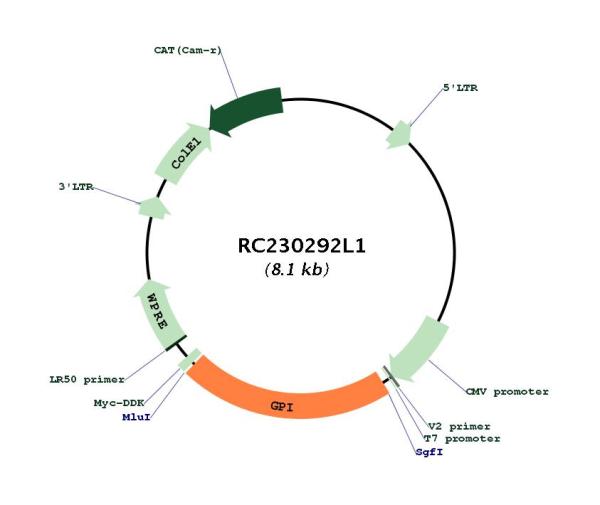Glucose 6 phosphate isomerase (GPI) (NM_001184722) Human Tagged Lenti ORF Clone
CAT#: RC230292L1
- LentiORF®
Lenti-ORF clone of GPI (Myc-DDK-tagged)-Human glucose-6-phosphate isomerase (GPI), transcript variant 1
"NM_001184722" in other vectors (6)
USD 447.00
Specifications
| Product Data | |
| Type | Human Tagged ORF Clone |
| Tag | Myc-DDK |
| Symbol | Glucose 6 phosphate isomerase |
| Synonyms | AMF; GNPI; NLK; PGI; PHI; SA-36; SA36 |
| Vector | pLenti-C-Myc-DDK |
| E. coli Selection | Chloramphenicol (34 ug/mL) |
| Mammalian Cell Selection | None |
| Sequence Data |
The ORF insert of this clone is exactly the same as(RC230292).
|
| Restriction Sites |
SgfI-MluI
Cloning Scheme for this gene
Plasmid Map

|
| ACCN | NM_001184722 |
| ORF Size | 1707 bp |
| OTI Disclaimer | Due to the inherent nature of this plasmid, standard methods to replicate additional amounts of DNA in E. coli are highly likely to result in mutations and/or rearrangements. Therefore, OriGene does not guarantee the capability to replicate this plasmid DNA. Additional amounts of DNA can be purchased from OriGene with batch-specific, full-sequence verification at a reduced cost. Please contact our customer care team at custsupport@origene.com or by calling 301.340.3188 option 3 for pricing and delivery. The molecular sequence of this clone aligns with the gene accession number as a point of reference only. However, individual transcript sequences of the same gene can differ through naturally occurring variations (e.g. polymorphisms), each with its own valid existence. This clone is substantially in agreement with the reference, but a complete review of all prevailing variants is recommended prior to use. More info |
| OTI Annotation | This clone was engineered to express the complete ORF with an expression tag. Expression varies depending on the nature of the gene. |
| Product Components | The ORF clone is ion-exchange column purified and shipped in a 2D barcoded Matrix tube containing 10ug of transfection-ready, dried plasmid DNA (reconstitute with 100 ul of water). |
| Reconstitution | 1. Centrifuge at 5,000xg for 5min. 2. Carefully open the tube and add 100ul of sterile water to dissolve the DNA. 3. Close the tube and incubate for 10 minutes at room temperature. 4. Briefly vortex the tube and then do a quick spin (less than 5000xg) to concentrate the liquid at the bottom. 5. Store the suspended plasmid at -20°C. The DNA is stable for at least one year from date of shipping when stored at -20°C. |
| Reference Data | |
| RefSeq | NM_001184722.1, NP_001171651.1 |
| RefSeq ORF | 1710 bp |
| Locus ID | 2821 |
| UniProt ID | P06744 |
| Cytogenetics | 19q13.11 |
| Protein Families | Druggable Genome |
| Protein Pathways | Amino sugar and nucleotide sugar metabolism, Glycolysis / Gluconeogenesis, Metabolic pathways, Pentose phosphate pathway, Starch and sucrose metabolism |
| MW | 64.8 kDa |
| Gene Summary | This gene encodes a member of the glucose phosphate isomerase protein family. The encoded protein has been identified as a moonlighting protein based on its ability to perform mechanistically distinct functions. In the cytoplasm, the gene product functions as a glycolytic enzyme (glucose-6-phosphate isomerase) that interconverts glucose-6-phosphate and fructose-6-phosphate. Extracellularly, the encoded protein (also referred to as neuroleukin) functions as a neurotrophic factor that promotes survival of skeletal motor neurons and sensory neurons, and as a lymphokine that induces immunoglobulin secretion. The encoded protein is also referred to as autocrine motility factor based on an additional function as a tumor-secreted cytokine and angiogenic factor. Defects in this gene are the cause of nonspherocytic hemolytic anemia and a severe enzyme deficiency can be associated with hydrops fetalis, immediate neonatal death and neurological impairment. Alternative splicing results in multiple transcript variants. [provided by RefSeq, Aug 2016] |
Documents
| Product Manuals |
| FAQs |
| SDS |
Resources
Other Versions
| SKU | Description | Size | Price |
|---|---|---|---|
| RC230292 | GPI (Myc-DDK-tagged)-Human glucose-6-phosphate isomerase (GPI), transcript variant 1 |
USD 794.00 |
|
| RC230292L2 | Lenti-ORF clone of GPI (mGFP-tagged)-Human glucose-6-phosphate isomerase (GPI), transcript variant 1 |
USD 1,094.00 |
|
| RC230292L3 | Lenti-ORF clone of GPI (Myc-DDK-tagged)-Human glucose-6-phosphate isomerase (GPI), transcript variant 1 |
USD 1,094.00 |
|
| RC230292L4 | Lenti-ORF clone of GPI (mGFP-tagged)-Human glucose-6-phosphate isomerase (GPI), transcript variant 1 |
USD 1,094.00 |
|
| RG230292 | GPI (tGFP-tagged) - Human glucose-6-phosphate isomerase (GPI), transcript variant 1 |
USD 994.00 |
|
| SC328930 | GPI (untagged)-Human glucose-6-phosphate isomerase (GPI) transcript variant 1 |
USD 796.00 |
{0} Product Review(s)
Be the first one to submit a review






























































































































































































































































 Germany
Germany
 Japan
Japan
 United Kingdom
United Kingdom
 China
China



